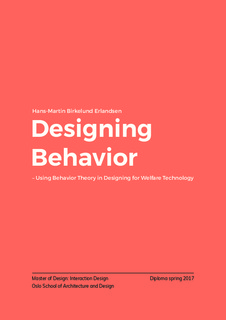Designing Behavior – Using Behavior Theory in Designing for Welfare Technology
Description
This project explores how behavior theory can be used to make welfare technology more engaging and better at facilitating healthy behavior change for patients with lifestyle diseases. Everyday life is where most of the treatment or rehabilitation occurs for many patients and where the patient’s lifestyle is an important factor. Currently, the health system has a limited capacity to assist in this context, and most patient-system interactions are limited to short visits or check-ups. Through extensive research on behavior models, I developed a new behavioral model, the Unified Behavioral Model (UBM), which serves as the basis for the design delivery. The UBM model can potentially be used as a framework for other behavior-related services. The design delivery also incorporates several needs discovered during the user research phase, such as the the need for social interaction or a calm yet inspiring monitoring system.
